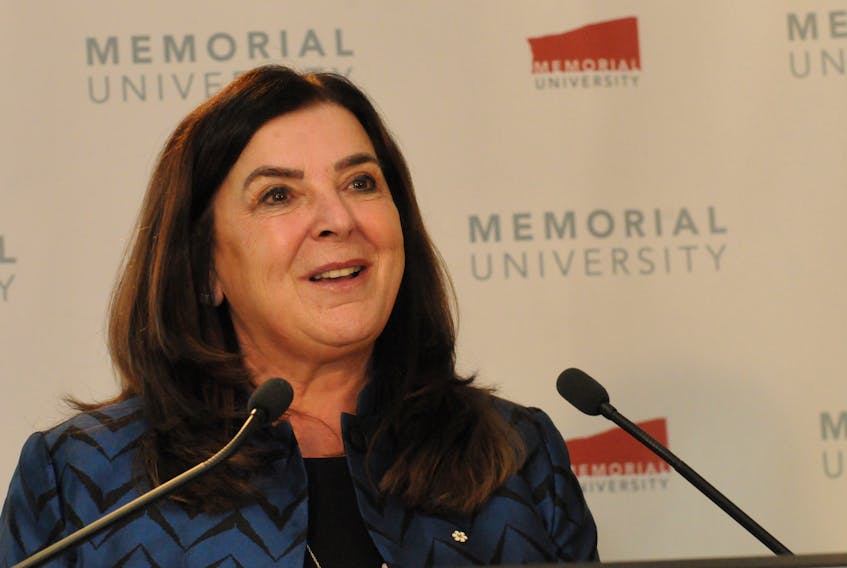ST. JOHN'S, N.L. — Memorial University's president says she is willing to discuss and address action items brought up in an open letter reacting to comments she made during a recent news conference on the oil and gas industry.
The open letter, which was released publicly Tuesday and had over 600 signatures attached to it as of mid-day Wednesday from MUN faculty, staff, alumni and students, took Vianne Timmons to task over what it considered statements that amount to a show of "open-ended support for the oil and gas sector on behalf of Memorial University."
During a May 26 news conference involving Premier Dwight Ball, Natural Resources Minister Siobhán Coady and a variety of oil and gas sector representatives, Timmons said MUN and the industry were "intrinsically linked," highlighting the fact many graduates of the university have gone on to work in the industry. She also made note of past and ongoing research projects and collaborations.
"Together with our many partners, we've accomplished a lot over the past 30 years, and it is that collaboration with government and industry that will help us build a path for the future," she said. "We have a great foundation to accomplish even more over the next 30 years. We all share a common goal, and that is to make sure we continue to build a dynamic oil and gas industry for the benefit not just of our great province, but the entire country."
The open letter — a copy of which was provided to Timmons the day before it was released publicly — took exception to Timmons' participation in the news conference, which was held as part of a push to get the federal government to financially assist an industry hit hard by a substantial decline in oil and gas prices. Drilling activity on the Hibernia oil platform ceased in April, and the West White Rose offshore oil project has been suspended for at least the remainder of 2020.
The letter noted that only last fall, MUN senior leaders signed a crisis pledge to take meaningful action to address climate change.
"However, your comments on Tuesday make us question how seriously senior leaders at Memorial take their commitment to combating the global climate crisis, and instead whether you are putting support behind the oil industry and the provincial government’s ill-defined calls for federal funding," the letter stated. "This is particularly concerning at this time in history: 99.9 per cent of climate scientists agree that global warming is caused by human activity and the largest emitters of greenhouse gases in Canada are the oil and gas and transportation sectors."
The letter also suggested committing excessively to the future of oil and gas may not fit with the times.
"Aligning Memorial University with oil and gas commits us to what will soon be obsolescence," it said. "Universities should be leaders in new thinking on 'wicked' problems like global climate change, not tools for propping up damaging or outdated approaches."
Academic freedom
In addition to the issue of climate change, the letter suggests Timmons' support shown on behalf of the university could undermine academic freedom at Memorial.
Rachel Webb Jekanowski, a Banting Postdoctoral Fellow with Memorial's department of English, was the lead author of the letter, which came out of a conversation involving herself and others.
"I would say, the university has a long history of working with a variety of industries and weighing in on the most important policy matters of the day," she said. "I see no issue with government and universities working together with members of the private sector. That's not the issue."
She is, however, alarmed by the perception she came away with from Timmons' comments — that Memorial is beholden to the industry.
"The issue here was that her remarks — particularly her use of 'we' and her use of terms like 'Memorial is intrinsically linked with oil and gas' — these kinds of phrases gave the appearance that senior administration wanted to continue to link the future of this independent institution with one industry. Going forward, we can't necessarily have a platform for peer-reviewed, scientific research or a variety or diversity of thought around really complicated issues like climate change or energy if the university is beholden to a single industry."
Jekanowski said the university needs to ensure its top priority remains promoting academic freedom and supporting students and academics who ask difficult questions.
"It's really a question of independence," she said. "The university has to be an independent body that makes the best decision it can make for its own community. Those decisions might be, for instance, funding a green energy technology think-tank internally. It might be helping graduates find jobs in the current industries that are available to them, which would include oil and gas. But participating in an event on that scale with government leaders and industry leaders and really acting as if the university was in lock-step with these corporate and government interests — that really erodes our own sense of independence."
Action items
The open letter calls on MUN's senior leadership team to recommit itself to last year's crisis pledge, including a 2050 target for net zero greenhouse gas emissions and a decision-making process that always takes climate change into consideration. It also requests that those same leaders "(a)void further statements of open-ended support for the oil and gas sector on behalf of Memorial University."
Timmons issued a response letter to Jekanowski Monday, which was shared publicly through the Memorial University Gazette the next day. Timmons, who officially took over the position of president in April, wrote that she is committed to the crisis pledge and would discuss the action items addressed in the letter with the senior leadership team this week.
In an interview with The Telegram, Timmons confirmed initial discussions with that team have already taken place, noting some action is already being taken in relation to the crisis pledge.
A job posting will be released shortly to hire a climate action officer to work on an action plan for the university, and Timmons said the university's sustainability office will be moved to report directly to the office of one of MUN's vice-presidents.
"This was all planned before this letter came, to have us move on the area of climate change and the work that we as an institution can do ourselves in looking at our own practices and our own buildings," she said. "We're looking at converting our hot water boiler, which provides hot water to the entire St. John's campus, from fossil fuel to electricity in the utilities annex. That is equivalent to taking 7,000 cars off the road."
As for her involvement in last Tuesday's news conference, Timmons said she was simply asked to speak about Memorial University's connection to the oil and gas industry, and she stuck to that role in her comments.
"It was received by some that that was a carte blanche, open-ended support for oil and gas. That was not what I said, nor is it my views," she told The Telegram. "I wanted to be factual and recognize that the university does have connections with the oil and gas industry. It's a reality. Many of our faculty do research that adds safety to people, that provides efficiencies and better technologies for the oil and gas industry. That's all positive and the reality of today. … It in no way impinges on academic freedom, in my view, to present facts around connections the university has."
Timmons said a wealth of great work and research relevant to climate change is produced at Memorial, and nobody at the university should flinch at bringing new ideas to light on the environment, whether or not those ideas fundamentally oppose the existence of an industry like oil and gas.
"I'm a fierce advocate for academic freedom and I will make sure that our faculty are able to speak out on issues," she said.
Jekanowski said she was pleased with Timmons' initial response to the open letter.
“We really appreciate her willingness to engage on this issue,” she said. “We see this not as a personal issue or an issue really limited to one event. It's more this event sparked a conversation that's been going on in many sectors of the university and the community for a long time — how can we continue to showcase a spectrum of opinions around where the university can go while still preserving academic freedom and making progress on what we consider it to be.”
Twitter: @CBNAndrew









